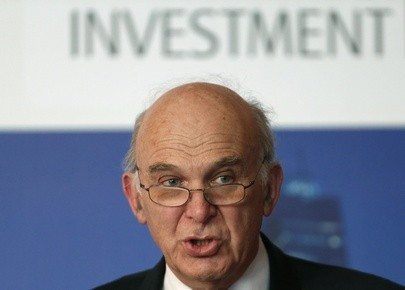Business Secretary Vince Cable's Royal Mail Sale Answers Met With Scepticism by MPs

Business Secretary Vince Cable's explanation of the government's sale of shares in Royal Mail has been met with "scepticism" by a committee of MPs.
The minister delivered a stinging attack on the Labour opposition and analysts who claim the Royal Mail is being sold off on the cheap.
In his first statement since the sale started, Cable told MPs there are those "in public life" or "the fringe of the market" who claim the business has been undervalued to the tune of about £1bn in a bid to realise a quick, successful sale.
Cable was giving evidence to a powerful Commons select committee on the privatisation, which has come under attack from workers and Labour for amounting to a nothing more than a "fire sale" to line the Treasury's pockets.
Labour had demanded a statement on the privatisation but attempts to force Cable to the Commons despatch box were postponed in favour of attacking him at the committee hearing.
Cable dismissed claims the sale had been done on the cheap and maintained the government had done everything possible to find solid, long-term investors for the purchase, insisting the opening share price had been the right one.
But at the end of a 90-minute hearing which saw him challenged on key aspects of the sale, the committee chairman, Labour's Adrian Bailey, said there had been "scepticism about some of the answers" and promised the MPs would re-visit the issue soon.
Cable told the committee: "There have been people out there rather unwisely listening to a few people operating on the fringe of the market and saying this is cheap stock, rush out and buy it. That is unwise ... this is a matter of responsibility."
Shadow Business Secretary Chuka Umunna has been in the forefront of claiming the sale was undervalued and amounted to a "politically-motivated fire sale".
And he cited estimates by analysts claiming the true value of the business was £1bn more than the £3.3bn sale price.
"I do not want to rubbish them ... but on this occasion they are way outside the estimate of most equity analysts," he said, adding: "People in public life have to be very careful" about comments on share values during a sale.
But Bailey said his previous experience as an auctioneer suggested the fact the share sale had been oversubscribed by six or seven times was evidence they were cheap.
"If I saw lots of hands go up I would have undervalued it," he said.
Cable dismissed the analogy saying: "It is not the same. We think the price range was entirely sensible and robust and will be vindicated in time."
He told the committee the government had been careful to seek long-term investors who would not simply sell off shares in an attempt to make a quick profit.
But he said he might need to "do some more detailed work" on the type of workers who would be forced to hand back their shares if they left the company.
Under the current privatisation only so-called "good leavers" - those made redundant or leaving on health grounds for example - would be allowed to keep their allocation.
But Cable was unsure about the status of other groups of leavers and said he wanted to ensure the system was fair.
He rejected Labour suggestions he could levy a windfall tax on the profits made by the new owners on land sales in order to pay back taxpayers who had "filled a hole" in the firm's pension scheme to allow the sale.
© Copyright IBTimes 2025. All rights reserved.






















